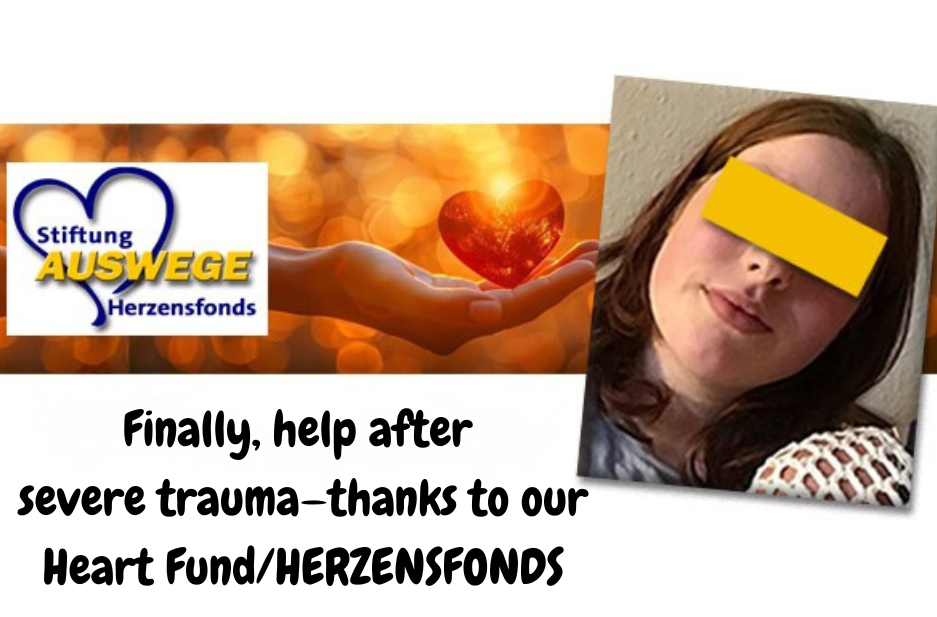“More helpful than all my previous Psychotherapies.”
Deeply shaken by her parents’ bitter divorce, sensitive Ella* had been in the care of mental health professionals for years due to post-traumatic stress disorder and chronic depression: in outpatient psychotherapy, in a psychiatric clinic, in a supervised residential group. But the now 14-year-old girl found the AUSWEGE/WAYS OUT- therapy camp “more helpful than all previous psychotherapy.” HERZENSFONDS made her participation possible with a four-figure grant.

Ella* spent the first two years of her life in a “stressful patchwork family,” as her mother Vera* (52) describes the brief relationship with the child’s father: with four
half-siblings, two from each parent. “After I left the ‘sinking ship’ with the children,” Vera admits,
“unfortunately, there were very unpleasant, stressful, and sometimes legal disputes with the father.
These were also traumatic experiences for Ella.” She prefers to keep the details to herself.
The six-year separation battle between Ella’s parents caused terrible collateral damage: the sensitive girl suffered a mental breakdown. She became depressed, began cutting herself, and repeatedly contemplated suicide. Ella’s school performance declined, and she began to refuse school attendance more frequently.
She withdrew from classmates and friends. Closely, almost symbiotically attached to her mother, Ella hid away with her; this led to increasing conflicts between the two, “with increasing puberty and experiences
during the Corona period,“ says Vera. ”In addition, my attempts at relationships with three different partners made it difficult for us to get along.”
From the age of four to eight, Ella was reportedly assisted by a “very nice” youth psychotherapist, according to her mother. But eventually, even Ella felt that outpatient psychotherapy was no longer sufficient. Starting in May 2022, she first spent three months as an inpatient at a clinic for child and adolescent psychiatry, then moved to a supervised residential group within a diaconal institution that also provides schooling. Ella was supposed to stay there until at least April 2024.
She was offered individual and group psychotherapy, movement, art, music, and equine therapy—but one thing was missing: a healthy, stable, supportive home that could have prevented her dramatic crisis from the outset
When Vera, who had become depressed, attended a WAYS OUT/AUSWEGE camp in the summer of 2023, she brought her daughter with her, hoping to find a way out for both of them.
But at first, shy Ella didn’t particularly like being in the middle of the camp community: “I felt it was too close here, with everything going on.”
Nevertheless, she also benefited, as her mother noted. During the camp, Ella “often opened up” and “stepped out of her comfort zone, so that she too could take home healing, peaceful, and beautiful moments.” At least the session with a Reiki practitioner brought Ella “a little bit of healing,” according to her own account.
During “aquatic bodywork” in the warm water of the indoor pool, lying in the arms of a therapist and being gently rocked back and forth, “I felt for a brief moment a lightness that I generally wish for in my life.”
A psychotherapist introduced Ella to the “Fast Phobia Cure,” a technique of neurolinguistic programming (NLP). With her help, the girl processed traumatic memories of her father: “I was supposed to imagine a movie theater in my mind’s eye that I could set up in such a way that I felt comfortable in it.
I was allowed to bring people there who strengthened me. Then we started: I was to play a situation that was weighing on me on the movie screen—in black and white, first forwards, then backwards, first fast, then slow.”
In this way, Ella was able to deal with her painful past in a more objective and less emotional way. She found this “more helpful than all my previous psychotherapies,” which she had undergone.
At the WAYS OUT/AUSWEGE camp, mother and daughter managed to “start talking to each other again and reconnect.” Vera was particularly touched when her child “danced for me and with me in our room” one evening. A psychiatrist who was also present at the camp noted that Ella “was able to stabilize well” during the camp.
Unfortunately, she seemed a little disillusioned at the end because she had to return to the dormitory.”
(*: pseudonym)


